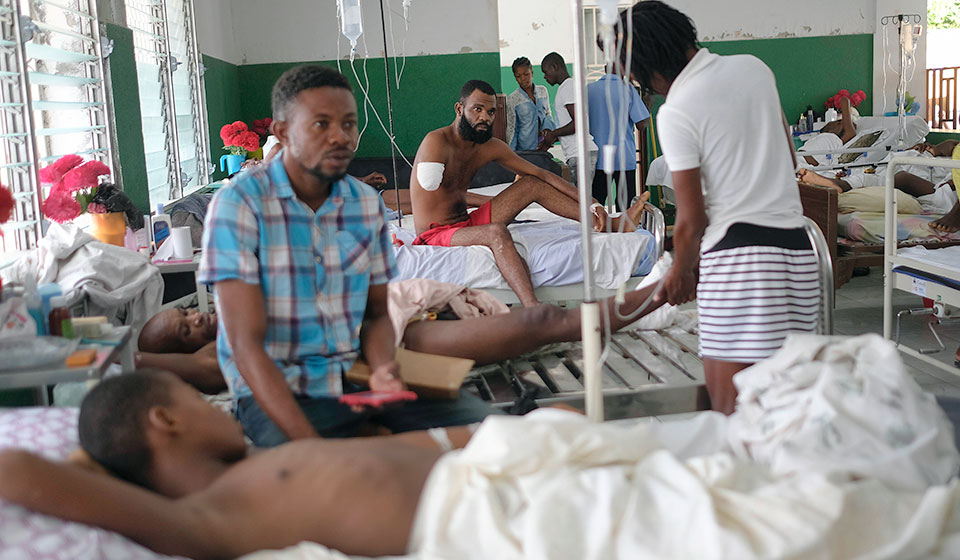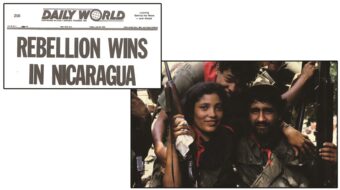
Plotters in Florida employing Colombian mercenary soldiers arranged to kill Haitian President Jovenel Moïse on July 7; rivalry among Haitian oligarchs may have played a role. A deadly earthquake followed and then flooding from a tropical storm. Amid the chaos, relief services are lacking in rural areas. U.S. Marines intruded, as the U.S. military had likewise done after the 2010 earthquake that killed some 230,000 people. Adverse effects of all these linger.
The marginalized descendants of rebellious slaves who founded independent Haiti in 1804 are resisting, however. Stirrings of socialist ideas and practice are evident.
The assassination of Moïse marked the end of ten years of corrupt and despotic rule. U.S. Secretary of State Hillary Clinton shoehorned President Michel Martelly into Haiti’s presidency in 2011. Moïse, his protégé, became president in 2017 on the strength of 500,000 votes drawn from six million eligible voters. Haitian political parties and their candidates serve a corrupt oligarchy.
Moïse had been ruling by decree, having refused to authorize parliamentary elections. His term was to have ended in February 2021, but supported by the U.S. government and the “Core Group,” he remained in office, thus defying Haiti’s 1987 constitution. He was calling for a new constitution that would allow agricultural conglomerates to swallow up small landholdings. Though he’s gone, the proposal is still alive.
Consisting of the U.S., Canadian, French, and Brazilian ambassadors and representatives of the United Nations, OAS, and the European Union, the Core Group came together in 2004, immediately after President Jean-Bertrand Aristide’s progressive government was removed by a U.S.- engineered coup. Aristide had been elected in 2000 with a 92% majority.
The Core Group supervises governance in Haiti and monitors political activities generally. Together with a United Nations military occupation force that remained until 2017, the entity is all about maintaining a Haitian status quo satisfactory to foreign powers.
For three years, aggrieved Haitians have periodically staged large protests. As described by economist and socialist Camille Chalmers, they have demanded, in succession: relief from shortages of fuel and other goods due to neoliberal-inspired withdrawal of subsidies, no more plunder of billons in funds derived from Venezuela’s PetroCaribe program, Moïse’s resignation, an end to U.S. interventionism, and cessation of Core Group backing of Moïse’s autocratic regime.
In August 2019, Haitian progressives drawn from 62 organizations met to discuss constitutional change and aspects of a transitional government. The business at hand, according to participant Chalmers, was to “establish the revolutionary left as a united force” and to develop a transition program for dealing with current political problems. They deliberated for three days and established the Patriotic Forum.
The Patriotic Forum gave rise to the “People’s Political Front” (PPF), which is now a potential vehicle for a six-party alliance prepared to compete in elections. The alliance includes the socialist party Rasin Kan Pèp La. (“Roots of the People’s Camp”) Functioning since 2015, that party has organized street mobilizations and released statements and analyses remarkable for their anti-imperialism.
Interviewed in 2018, party member Guerchang Bastia characterized his party’s role as “being present with the masses…developing real popular education…. So that when the masses are in the streets, they will recognize you as a leader [with] a proposal for a new society.” The purpose of the leftist organization, Bastia said, “is creating a new relationship with the masses [and] building the strength to fight against the capitalist system.”
Surveying Haiti’s situation prior to a March 2021 virtual meeting of international supporters, Chalmers outlined tasks ahead for the socialist cause and the PPF. A founding member of Rasin Kan Pèp La and a frequent spokesperson, he stated that “the Haitian people need to take their destiny into their own hands [with] a redefinition of the of the boss-slave relationship maintained between the international community and Haiti, and particularly between Haiti and the United States.”

Chalmers regards international solidarity as an “overriding necessity [required] for the success of the Haitian people in their struggle for radical change of the mafioso system installed to guarantee…the political, economic, and social interests of the imperialist powers, the multinationals, and the corrupt local elites.”
According to sociologist Lautaro Rivara, a member of the Dessalines Brigade in Solidarity with Haiti: “The history of class struggle in Haiti is a history predominantly of rural workers, as seen presently in the protagonism of peasant organizations…in convening and organizing the Patriot Forum. Now, as the People’s Patriotic Front, it’s the best advocate for the popular classes in the country.”
Rivara indicates that more than half of the Haitian people live in rural areas and are engaged in subsistence farming. Rates of Illiteracy remain high and healthcare and schooling for them are rudimentary or absent. Great numbers of needy and fearful Haitians have moved to cities or, most recently, to countries like Chile, Brazil, and the Dominican Republic.
Following the lead of U.S. military occupiers (1915-1934) in combating a guerrilla insurgency, paramilitary enforcers allied to the Duvalier dictatorships (1957-1986), and to U.S. intelligence agencies later on, carried out massacres in the Haitian countryside. The now-ended United Nations occupying force likewise carried out an anti-insurgency mission, according to Chalmers. Privatized paramilitaries accounted for many killings during the Moïse era.
In regard to international solidarity, Chalmers extolled the contributions of Cuba’s government and people; Venezuela’s Bolivarian Revolution; Jubilee South, based in Latin America and the Caribbean; and the Dessalines Brigade formed by Brazil’s Landless Workers’ Movement and by Via Campesina.
Via Campesina recently published a report on grim Haitian realities. Accessible here in English, it describes factional fighting between adherents of former presidents Martelly and Moïse over disposition of funds stolen from PetroCaribe and from foreign reconstruction funds following the 2010 earthquake. Clearly, such politicians would work overtime to defeat any popular mobilization.
The U.S. government is similarly inclined. The report blames U.S. agencies for complicity with corrupt sections of Haiti’s government in turning a blind eye to profits from narco-trafficking. It claims that “imperialism wants a new Haitian Constitution for allowing transnationals to buy land legally and openly in Haiti so as to squander and steal the natural resources of the state.”












Comments